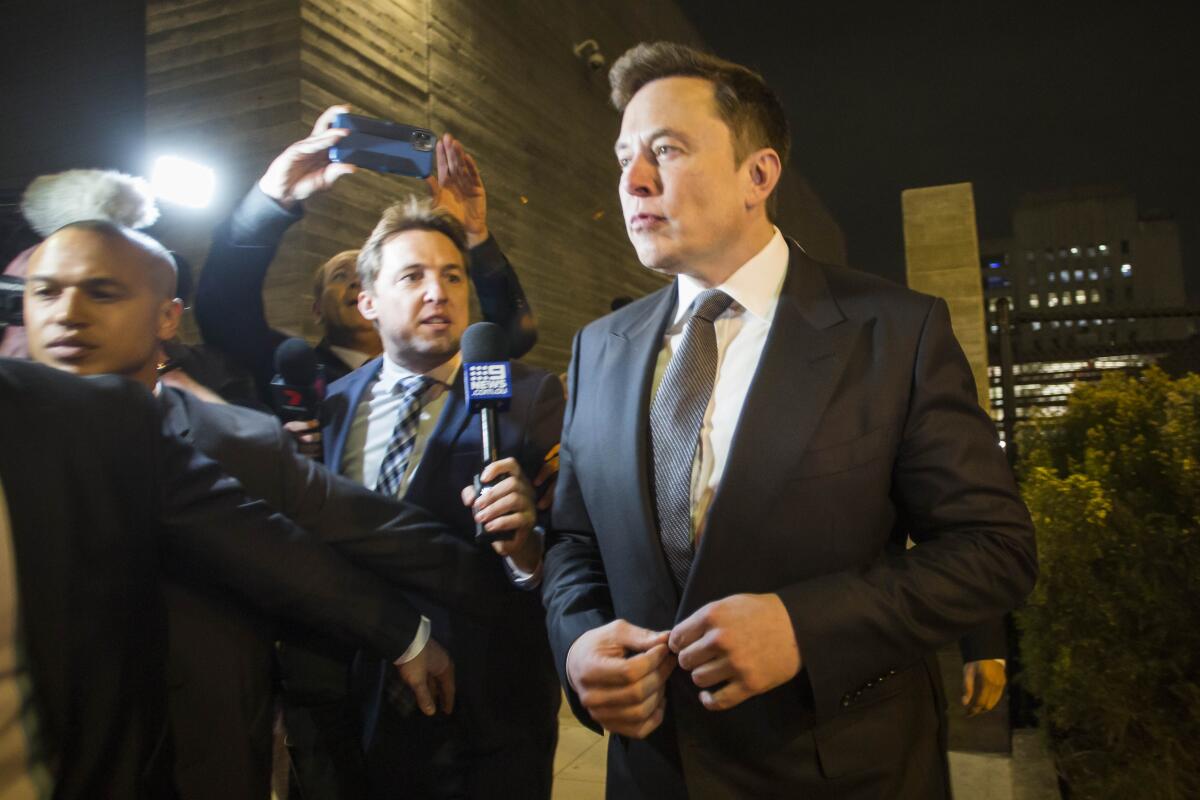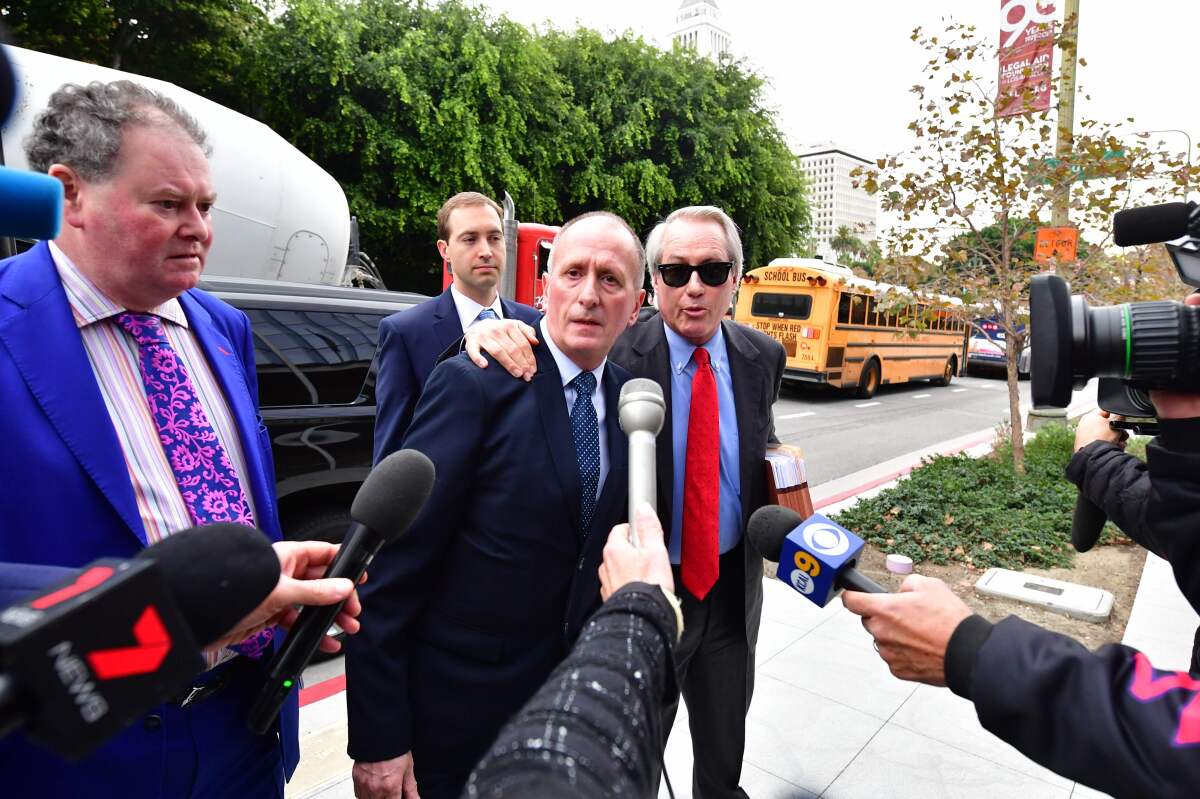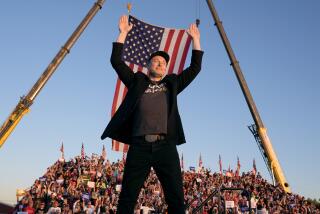Calling a stranger ‘pedo guy’ was just swapping Twitter insults, Musk testifies

Dressed in a black suit and wearing a somber expression, Elon Musk testified in a Los Angeles federal court Tuesday that he was merely trading insults with a British cave rescue diver when he called him a “pedo guy” on Twitter.
Musk, the chief executive officer of Tesla and SpaceX, is accused of defaming Vernon Unsworth with accusations of pedophilia and child rape with no basis in fact.
Unsworth helped lead the effort to extract 12 Thai boys and their soccer coach trapped in a flooded cave in July 2018.

The tweet came after Musk showed up in Thailand with a miniature submarine that he said could safely transport the children. On CNN, Unsworth called his move a “PR stunt” and said Musk “can stick his submarine where it hurts.”
Musk responded with the “pedo guy” tweet, and doubled down when a Twitter user questioned his claim, writing “bet ya a signed dollar it’s true.” Later Musk sent an email to a Buzzfeed reporter urging him to “stop defending child rapists,” apparently referring to Unsworth.
Musk testified that Unsworth’s criticisms were “wrong and insulting, so I insulted him back.” Musk’s lawyers argue that does not constitute defamation.
Unsworth’s attorney, L. Lin Wood, portrayed Musk as egotistical and vindictive. Musk accused Unsworth “of being a ‘pedo’ in the midst of what should have been one of the proudest moments of his life,” Wood said.
Unsworth is seeking unspecified compensatory and punitive damages.
On the stand in U.S. District Court in downtown L.A. Musk portrayed himself as a concerned human being trying to do the right thing.
“At first I thought my help would not be needed,” Musk said. But after a cave rescue diver died, with a monsoon on the way, it looked like a “pretty bad situation,” Musk said. “If immediate action wasn’t taken, the boys would die.”
“That would be on my conscience forever,” he said.
Declining Musk’s offer, the rescue team dressed the boys in wetsuits, supplied them with oxygen, anesthetized them to avoid panic, and guided them out underwater one by one.
In opening arguments, Musk’s lawyers painted Unsworth as a man hungry for fame who suffered no damages for being labeled a “pedo guy.” The tweet, the argument went, was a joke, which Musk later deleted and apologized for. “This case is about an argument between two men exchanging insults,” said Musk lawyer Alex Spiro.
The case is not the first time Musk’s Twitter behavior has caught up with him. In an August 2018 tweet, Musk claimed he had “funding secured” to take Tesla Inc. private. That tweet proved false and the U.S. Securities & Exchange Commission sued him for fraud. Musk settled, but had to pay a $20 million fine and give up his chairman’s seat at the electric car company.
Musk has called Twitter a “war zone.” He told the television news show “60 Minutes” last December that “if somebody’s gonna jump in the war zone, it’s like, ‘OK, you’re in the arena, let’s go!”
Musk’s ‘pedo guy’ tweet prompted a letter from Unsworth’s lawyer to Musk in August 2018, which read in part: “You published three different tweets to your 22 million followers that Mr. Unsworth engages in the sexual exploitation of Thai children, and you did so at a time when he was working to save the lives of 12 Thai children.”
Buzzfeed News reporter Ryan Mac ran a story about the letter, prompting an email from Musk, in which the executive told told him to “stop defending child rapists” and accused Unsworth of moving to Thailand to take a child bride. (Unsworth said his wife was 40 when he married her.)
Musk’s lawyers were unsuccessful in their attempt to keep the email from the jury.
When Wood asked Musk whether he should choose his words carefully, Musk replied, “There are a lot of things I say, and not all of them have the same quality of thought ... not everything can be thoughtful.”
At one point, when the lawyers were getting in the weeds of a following Twitter exchange, Musk, seemingly frustrated, noted that people say falsehoods on Twitter “all the time.”
More to Read
Inside the business of entertainment
The Wide Shot brings you news, analysis and insights on everything from streaming wars to production — and what it all means for the future.
You may occasionally receive promotional content from the Los Angeles Times.












